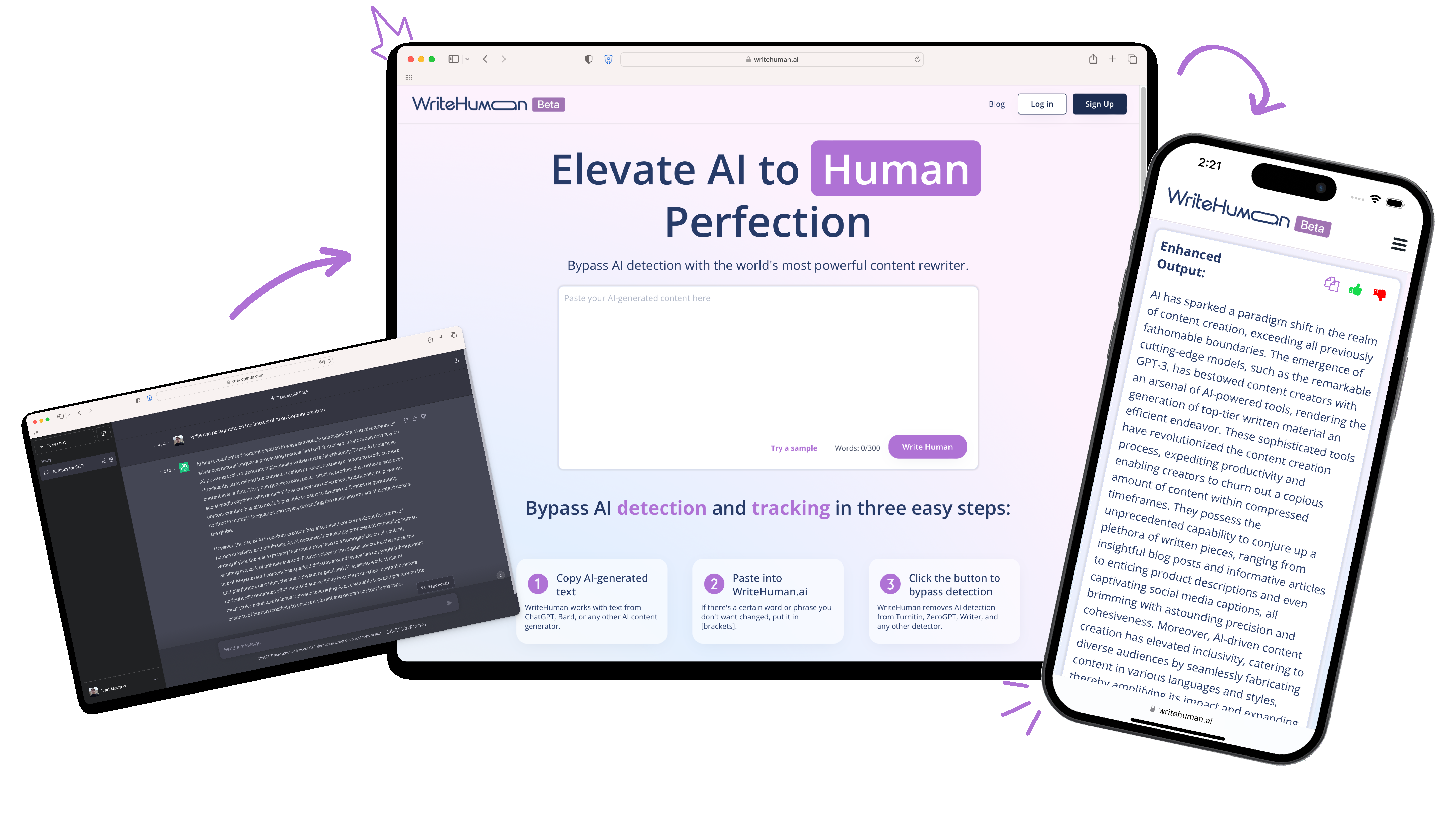A Midlothian-based startup that allows users to build off work created by artificial intelligence chatbots will be part of the latest group to go through a long-running local accelerator program.
AI company WriteHuman, which is designed to take AI-generated text from programs such as ChatGPT and put a more human touch on the writing, is among eight companies selected to participate in the regular accelerator program operated by Lighthouse Labs, the organization announced Thursday.
WriteHuman’s entry into the Lighthouse Labs program comes several months after the company launched a subscription model for its service.
Founded by JMU grad and Chesterfield County resident Ivan Jackson, WriteHuman essentially uses one form of AI to tweak text created by other AI programs that have recently risen in popularity. WriteHuman’s program aims to make the wording less robotic and more natural sounding, as well as to evade tools to detect AI’s hand in a piece of writing.
Jackson said the startup’s pitch is that its tweaks to AI writing give users an edge over competitors who rely more heavily on the raw output of ChatGPT and similar services.
“You can definitely tell by now what’s AI writing. That doesn’t mean you shouldn’t use AI writing, but use it in a way that’s more engaging and authentic, and that’s what we’re trying to do,” he said. “As (large language models) grow, it’s going to be about differentiation of the content.”
The program’s safeguards against AI detection are pitched as a means to preserve users’ privacy and avoid the stigma of using AI in their writing. Jackson said a common concern about AI detection among marketers is that Google could one day decide to make AI-generated results more difficult to find on its search engine, which Jackson said isn’t currently being done as far as he knows.
“That fear and that risk is a big thing for AI detection. That’s a big draw for the website,” he said.
Jackson said WriteHuman has fewer than 2,000 paid subscribers and 200,000 monthly users. In addition to several paid subscription tiers, WriteHuman allows limited free access to its service.
He said the service has thus far proven popular with marketers as well as people who are writing in English as their second language.
A monthly subscription to WriteHuman ranges from $12 for a basic package to $48 for the Ultra tier. The subscription tiers offer a varying number of so-called “humanizer credits” per month, which are expended each time the subscriber tweaks a set number of words. The basic package allows a user to expend one of its 80 monthly credits to tweak a 600-word block of text.

WriteHuman is an AI-powered writing software intended to improve upon text generated by programs such as Bard and ChatGPT. (Courtesy WriteHuman)
Jackson said he got the idea for WriteHuman in early 2023 amid the explosion of interest in ChatGPT and he quickly built a program for personal use. WriteHuman started its subscription service in late August, following the launch of the website the prior month.
Jackson, a Midlothian native, graduated from James Madison University with a degree in computer information systems in 2021. He also served as the executive editor of the student newspaper, the Breeze, an experience that drove his interest in writing and that also influenced WriteHuman.
Jackson said he invested more than $6,000 in startup costs to cover things such as advertising and website hosting. He said WriteHuman is profitable.
Jackson has handled the software development himself so far. WriteHuman is currently a one-man show, and he hopes his experience in the Lighthouse Labs accelerator program will give him the know-how to build a team to further scale the concept. WriteHuman is currently based at his home in Midlothian.
Jackson, 25, also currently works as a product consultant developer at GCOM Software, an IT company that offers digital services to local and state governments.
WriteHuman is the only locally based concept to be part of the latest Lighthouse Lab class, which is its 16th session.
The hybrid program starts March 4 and runs until mid-May, with the first and last weeks’ programs conducted in person locally.
Startups that go through the 11-week program get $20,000 in equity-free funding, in addition to the accelerator’s weekly educational programming and mentorship opportunities.
More than 250 startups applied to be part of the latest cohort, according to a Lighthouse Labs news release.
The other companies in this year’s class are:
- – 3D Orthobiologic Solutions, a Herndon-based medical company that builds 3-D printed implant scaffolds for reconstructive face surgery.
- – Billions, an Arlington-based software company that offers a platform to manage real estate teams.
- – InfraSGA, a Norfolk-based green infrastructure company with a modular stormwater runoff structure product.
- – KnoNap, an Arlington-based firm that has designed single-use tests intended to detect the presence of roofies and other drugs in beverages.
- – Mindflow, a Nashville-based mental health training and consultation firm geared toward student-athletes.
- – Nightingale Caring Solutions, a Philadelphia-based healthcare staffing software company.
- – Phalanx, an Arlington-based data security company.
A Midlothian-based startup that allows users to build off work created by artificial intelligence chatbots will be part of the latest group to go through a long-running local accelerator program.
AI company WriteHuman, which is designed to take AI-generated text from programs such as ChatGPT and put a more human touch on the writing, is among eight companies selected to participate in the regular accelerator program operated by Lighthouse Labs, the organization announced Thursday.
WriteHuman’s entry into the Lighthouse Labs program comes several months after the company launched a subscription model for its service.
Founded by JMU grad and Chesterfield County resident Ivan Jackson, WriteHuman essentially uses one form of AI to tweak text created by other AI programs that have recently risen in popularity. WriteHuman’s program aims to make the wording less robotic and more natural sounding, as well as to evade tools to detect AI’s hand in a piece of writing.
Jackson said the startup’s pitch is that its tweaks to AI writing give users an edge over competitors who rely more heavily on the raw output of ChatGPT and similar services.
“You can definitely tell by now what’s AI writing. That doesn’t mean you shouldn’t use AI writing, but use it in a way that’s more engaging and authentic, and that’s what we’re trying to do,” he said. “As (large language models) grow, it’s going to be about differentiation of the content.”
The program’s safeguards against AI detection are pitched as a means to preserve users’ privacy and avoid the stigma of using AI in their writing. Jackson said a common concern about AI detection among marketers is that Google could one day decide to make AI-generated results more difficult to find on its search engine, which Jackson said isn’t currently being done as far as he knows.
“That fear and that risk is a big thing for AI detection. That’s a big draw for the website,” he said.
Jackson said WriteHuman has fewer than 2,000 paid subscribers and 200,000 monthly users. In addition to several paid subscription tiers, WriteHuman allows limited free access to its service.
He said the service has thus far proven popular with marketers as well as people who are writing in English as their second language.
A monthly subscription to WriteHuman ranges from $12 for a basic package to $48 for the Ultra tier. The subscription tiers offer a varying number of so-called “humanizer credits” per month, which are expended each time the subscriber tweaks a set number of words. The basic package allows a user to expend one of its 80 monthly credits to tweak a 600-word block of text.

WriteHuman is an AI-powered writing software intended to improve upon text generated by programs such as Bard and ChatGPT. (Courtesy WriteHuman)
Jackson said he got the idea for WriteHuman in early 2023 amid the explosion of interest in ChatGPT and he quickly built a program for personal use. WriteHuman started its subscription service in late August, following the launch of the website the prior month.
Jackson, a Midlothian native, graduated from James Madison University with a degree in computer information systems in 2021. He also served as the executive editor of the student newspaper, the Breeze, an experience that drove his interest in writing and that also influenced WriteHuman.
Jackson said he invested more than $6,000 in startup costs to cover things such as advertising and website hosting. He said WriteHuman is profitable.
Jackson has handled the software development himself so far. WriteHuman is currently a one-man show, and he hopes his experience in the Lighthouse Labs accelerator program will give him the know-how to build a team to further scale the concept. WriteHuman is currently based at his home in Midlothian.
Jackson, 25, also currently works as a product consultant developer at GCOM Software, an IT company that offers digital services to local and state governments.
WriteHuman is the only locally based concept to be part of the latest Lighthouse Lab class, which is its 16th session.
The hybrid program starts March 4 and runs until mid-May, with the first and last weeks’ programs conducted in person locally.
Startups that go through the 11-week program get $20,000 in equity-free funding, in addition to the accelerator’s weekly educational programming and mentorship opportunities.
More than 250 startups applied to be part of the latest cohort, according to a Lighthouse Labs news release.
The other companies in this year’s class are:
- – 3D Orthobiologic Solutions, a Herndon-based medical company that builds 3-D printed implant scaffolds for reconstructive face surgery.
- – Billions, an Arlington-based software company that offers a platform to manage real estate teams.
- – InfraSGA, a Norfolk-based green infrastructure company with a modular stormwater runoff structure product.
- – KnoNap, an Arlington-based firm that has designed single-use tests intended to detect the presence of roofies and other drugs in beverages.
- – Mindflow, a Nashville-based mental health training and consultation firm geared toward student-athletes.
- – Nightingale Caring Solutions, a Philadelphia-based healthcare staffing software company.
- – Phalanx, an Arlington-based data security company.




Congratulations Ivan and WriteHuman! I have been using ChatGPT a lot more and at times does sound too robotic with it’s responses. Love seeing Ai start-ups, the development and adoption of Ai in the Richmond area.
Go Dukes!!!